On May 2, social justice and feminist educator Amelia Meman tweeted some thoughts about the first volume of Man-Eaters, an Image Comics series written by Chelsea Cain (Mockingbird) and illustrated by Kate Niemczyk (Mockingbird). Meman picked up the first collected volume based on a recommendation from their local comic shop and noted, in a direct message to The Beat, that “I’m really into any stories that have that sort of bend,” especially because of their line of work.
However, as Meman read, “I kept waiting for the really essentialist viewpoint to be resolved and it never did. There was also a lot of comparisons between this dystopian hyper sexism and racism which were really uncomfortable to read.”
Among them, as noted by other critics throughout the weekend, is a scene in Man-Eaters where boys harass Maude for drinking from a water fountain not meant for her, which explicitly evokes Jim Crow laws, thereby comparing institutionalized racism to sexism. This not only ignores the experiences of women of color, specifically black women, but draws parallels between experiences that ultimately are not comparable.
In a four-tweet thread in May, Meman tagged Image Comics, in addition to using the #ManEaters hashtag; they noticeably did not tag Cain or any of the other creatives on the Man-Eaters team, though Cain later replied to the thread. By request, The Beat has quoted Meman’s tweets below, rather than embedding directly from Twitter.
“I want to like @ImageComics #ManEaters so bad, but it is SO HEAVILY founded in bio essentialism and TERFness that it’s impossible to not feel like it perpetuates the same misogyny/systemic violence that it’s attempting to tackle,” Meman tweeted. “#ManEaters, while def cute and smart and a fun concept, is also just as lazy and exclusionary as pussy hats, white feminism, Taylor Swift-ing pop feminism.”
Meman continued in another tweet, “I appreciate any comic on menstruation and the literal violent eating of men—I super duper do—but #ManEaters further cements the toxicity of a gender binary in a heavy handed, sad way.” In conclusion, they tweeted, “I’m trying so hard to be generous here, but the conflict comes when—to be generous—also means negating the lives, experiences, and crucial work of the trans community that I love. Anywho. #ManEaters = an attempt at incisive feminist commentary that incisively bites it’s [sic] own ass.”
As noted above, Cain replied to these tweets on May 6. At time of writing, Cain has deleted her entire Twitter account, leaving The Beat to rely solely on screencaptures of her posts. More on why Cain deleted later. In response to Meman’s concerns, Cain tweeted, “Again, thanks for the feedback. Seems like you’re a regular reader. Which is…weird. Because you hate us. I’m so grateful for the work of our three 14-year-old contributors. And then I read comments like yours, and I think WHAT HAVE I DONE?”
Meman thanked Cain for reading the feedback. Then they tweeted, “I don’t hate you all/your work. I just wish there was more nuance to the way y’all talk about gender/sex/health.”
These are critiques that have been leveled at Cain and the Man-Eaters team since the first issue hit shelves last year. In fact, I commented on these issues in my review of the second issue, which was published at The Beat in October. From the jump, Cain’s script was noted for its exclusion of transgender characters, which seemed remiss in a world based entirely around the idea of menstruating people turning into big, murderous cats. In response to these critiques, Cain repeatedly assured readers that she was telling the story of one character, a cisgender teenage girl named Maude.
When replying to Meman in May, Cain trotted out this line of defense once again. “We will work on being more nuanced,” she tweeted. “And less specific. I guess I think of stories as points-of-view. As in, a person’s story in the world. I guess I thought that being specific was kind of the reason I was doing this.”
“Given that it’s a feminist comic, I believed that if I were to do a ‘call in’ rather than a ‘call out,’ maybe that would start a good discussion on the ol’ Twitter,” Meman told The Beat on Sunday. “I was surprised Cain tweeted back, and I was also a little jarred by her defensiveness but that’s natural when faced with feedback. I invited conversation about this (one that was more nuanced than Twitter allows) and thought that was the end of that (there was no follow up).”
The follow-up to Meman’s brief Twitter conversation with Cain came a full month later, when someone tweeted Meman to inform them that two of their tweets had been printed, verbatim, in Man-Eaters #9, which hit shelves June 5. The tweets appeared as propaganda on billboards in a “menstruation concentration camp,” where Maude and others were forced to drink progesterone- and estrogen-infused water by the bucketloads in order to prevent their transforming into big cats.
Here’s the thing: it’s against copyright law to reprint someone’s tweets without permission or credit, if someone does so without using Twitter’s tools for sharing and embedding.
Twitter’s Terms of Service say, “You retain your rights to any Content you submit, post or display on or through the Services. What’s yours is yours — you own your Content (and your photos and videos are part of the Content). By submitting, posting or displaying Content on or through the Services, you grant us a worldwide, non-exclusive, royalty-free license (with the right to sublicense) to use, copy, reproduce, process, adapt, modify, publish, transmit, display and distribute such Content in any and all media or distribution methods (now known or later developed). This license authorizes us to make your Content available to the rest of the world and to let others do the same.”
Essentially, that means: you own what you tweet, but you grant Twitter license to use anything you post on the platform. There’s enough of a loophole here that anyone can embed tweets on their website, without permission, as long as they use Twitter’s tools to do so. Similarly, anyone can retweet or quote-tweet something someone has said on a public account. This is often how harassment campaigns start; someone shares or embeds a tweet and then the trolls come calling. However, people can’t take the content of your tweets and do whatever they want with it.
Publishing Meman’s tweets in Man-Eaters not only opens them up to harassment from people who can search the text of those tweets; it also infringes on Meman’s copyright.
In a message to The Beat, they said, “It feels weird. I’m GLAD they’re not attributed to me, and I don’t really know what the point of [reprinting them] was. I feel like I’m being framed as a troll?? Which feels very weird, but luckily most people have been really supportive and validating. I do not expect any sort of legal rights argument to come out my way, and I don’t really care that my tweets were taken. I posted them publicly, and I’m not so naive to go down such a thorny, expensive, and petty road. If they were attributed to me, I would feel much less okay. I also don’t expect any sort of apology? It doesn’t seem in character [for Cain]; however, low expectations… low threshold to be proven wrong.”
They added, “I don’t feel my comments were mean or incendiary nor do I feel they were in any way incorrect. I thought about those comments pretty hard… so I also felt pretty angry. It’s pretty ironic to have not given any sort of knowledgeable consent to Man-Eaters/Cain in this whole process, which is hilariously cruel.”
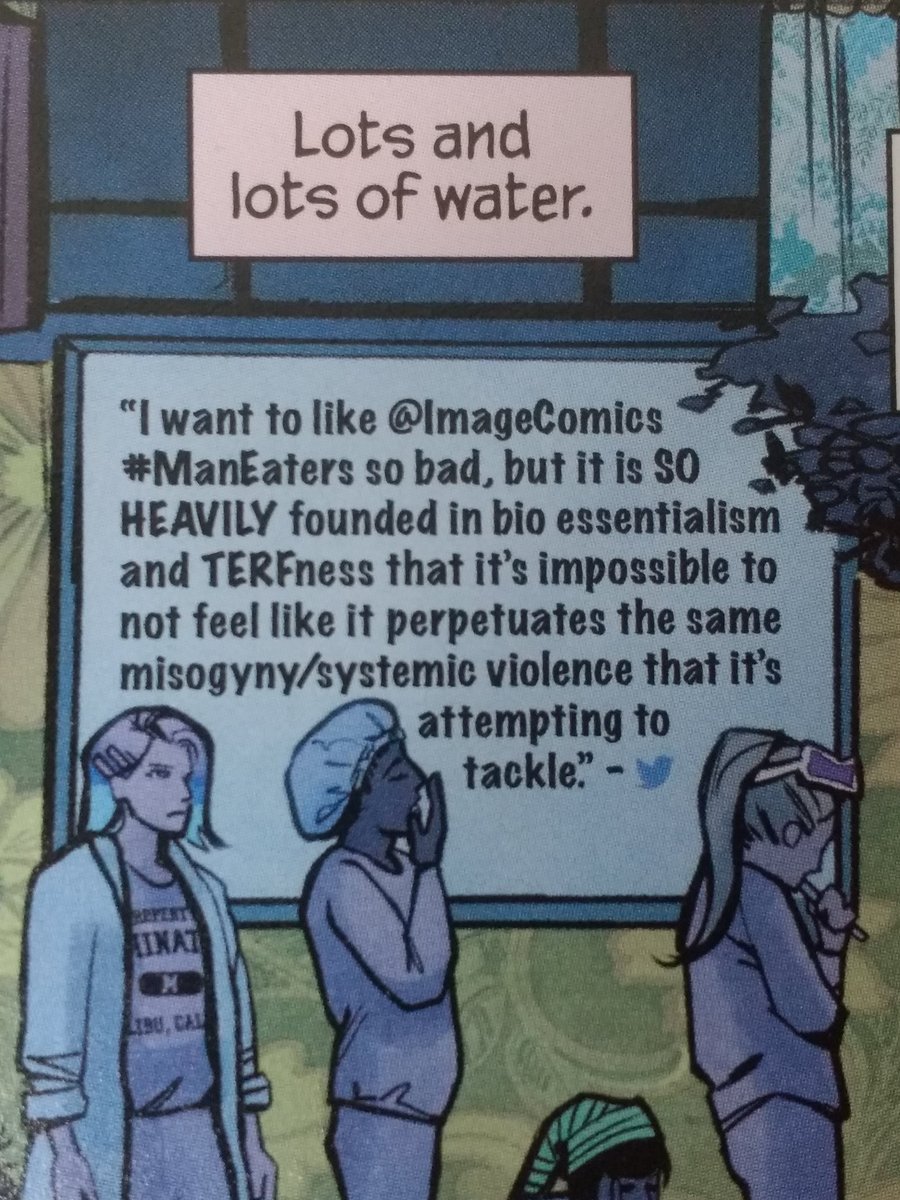
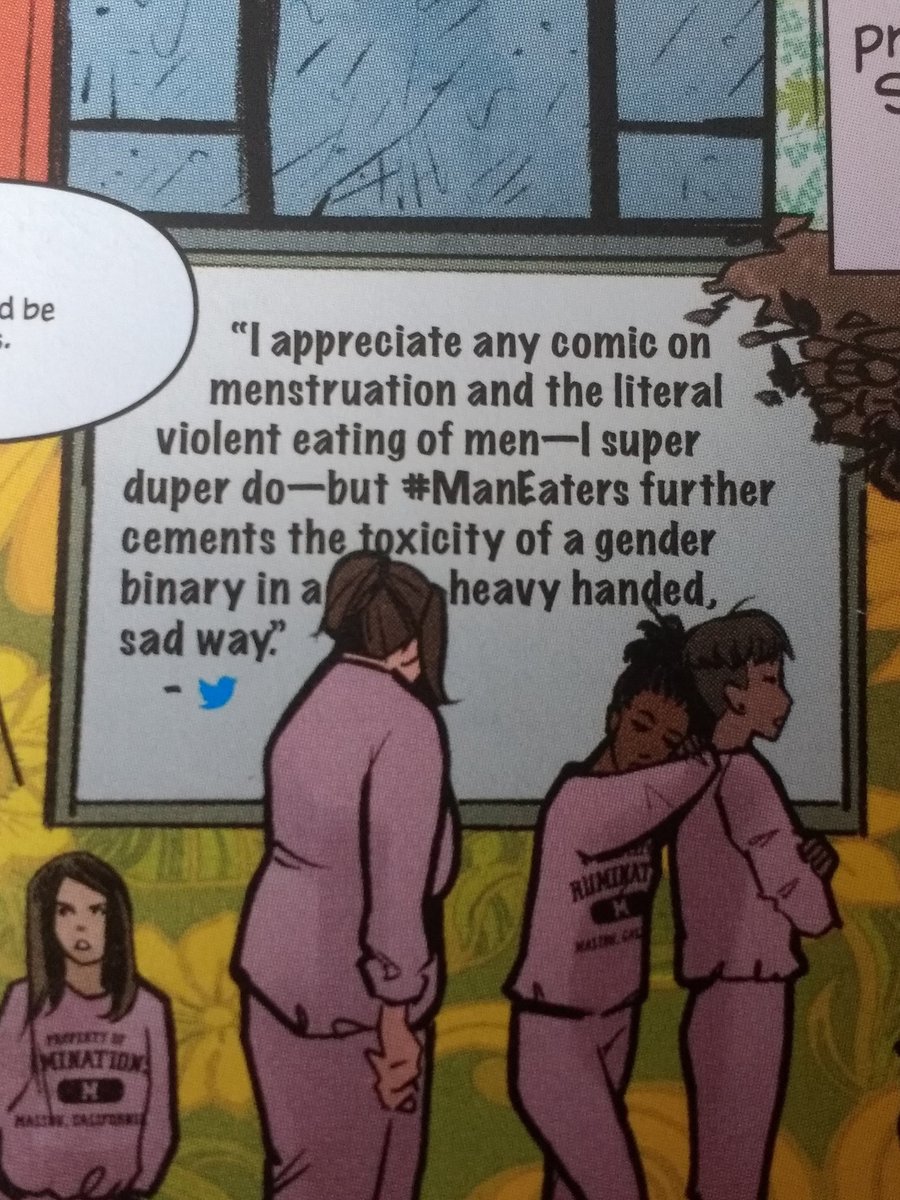
As people caught on to what happened, creators, critics and fans alike began discussing how inappropriate it was for Cain to reprint Meman’s tweets, especially after her initial reply. Cain insisted that she did not know tweet text could be searched; she said that by not including Meman’s handle, she believed it was OK to include the tweets in her comic.
She went on to tweet several times Saturday night and throughout Sunday, often commenting on how vile Twitter can be — something she is familiar with, after she was harassed by sexist trolls for the “Ask Me About My Feminist Agenda” cover drawn by Joëlle Jones for Mockingbird — and defending herself. Throughout the weekend, Cain repeatedly commented on how she was “screwing up.” She frequently invoked the three teenagers who contribute to Man-Eaters. She did not address the reprinted tweets directly on her feed. Her only mention of the reprinting was in reply to a comment made by critic C.K. Stewart, and only to say that she didn’t know it was wrong to print them in the first place.
On Sunday, Cain asked if anyone would be interested in being a trans sensitivity reader for the final three issues of Man-Eaters — though she said up front that she couldn’t pay. This prompted another wave of criticism, as trans critics and professionals told Cain that they would do the work, but only if it was compensated. Some of Cain’s responses are captured in the below screenshots.
Some hours later, Cain deleted her Twitter account after posting, “MAN-EATERS has meant a lot to a small group of people, and we will finish the last three issues for them. I’m sorry I’m not who you want me to be, and I’m sorry that ME can’t be inclusive of every experience.” When The Beat attempted to reach out for comment on this story (via Twitter, since Cain doesn’t have an e-mail address or contact form available on her website), we did not receive a response before Cain deleted her profile. Image Comics, Cain’s publisher, had no comment.
In the midst of the drama, several critics asked Cain to apologize to Meman and promise to redact the tweets from future printings of Man-Eaters #9, including in collected issues. They encouraged her to read about trans identities and to consider hiring an editor for her creator-owned work. Throughout all of this, Cain did not apologize directly to Meman — something they noted both on Twitter and in a message to The Beat.
“[For the record],” Meman posted on Sunday, “Chelsea Cain manages to say a lot of shit but I’ve not seen a goddam thing directed toward me.” In a direct message, they added, “I read through Cain’s meltdown and it seems par for the course. Me-centered language, self-victimization, blaming others, and then using super broad generalizations (‘I can’t do anything right’). I know how abuse works, how power is exploited, etc. because that’s what I study in my work. I’m not that surprised but I’m still super disappointed and a little embarrassed. I would still have a conversation with Cain about any of this stuff, but she doesn’t seem ready to listen at all. I feel hurt, I feel angry, but I also feel like my expectations have been low this whole time.”


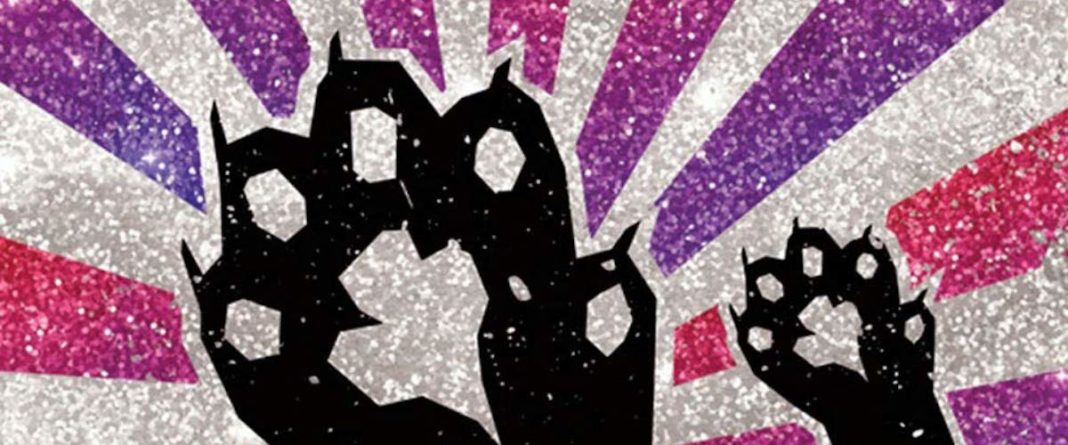
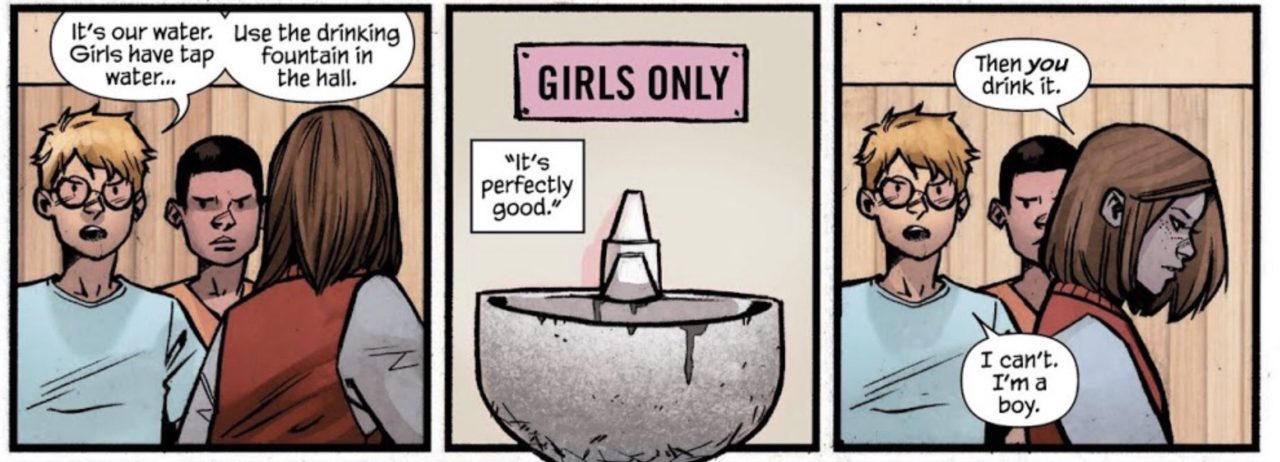
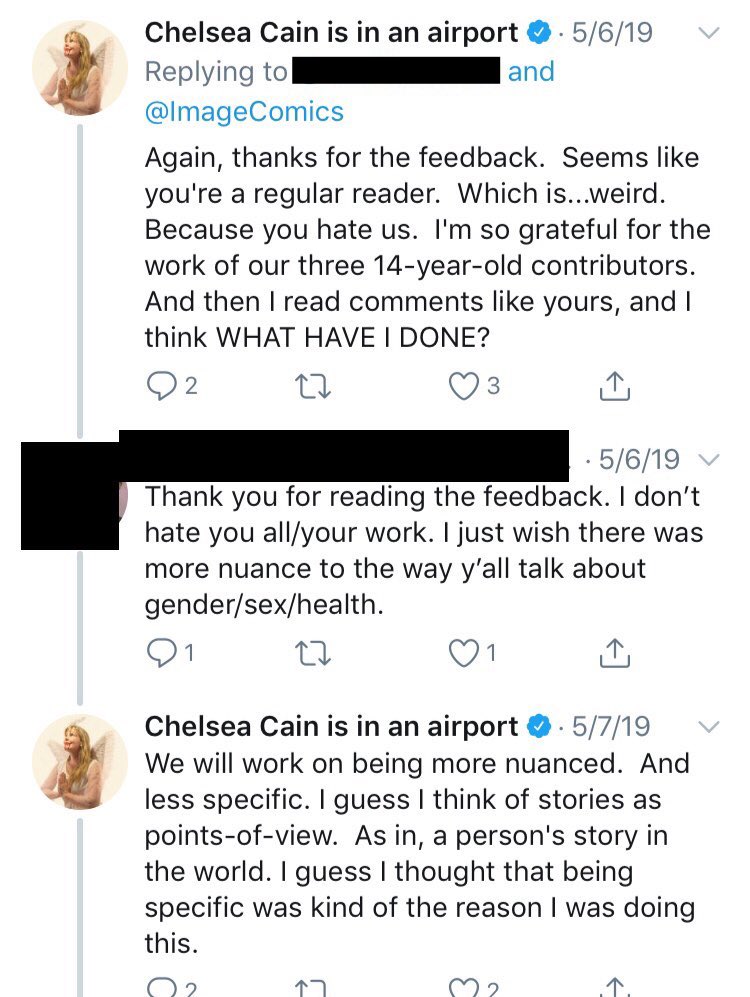
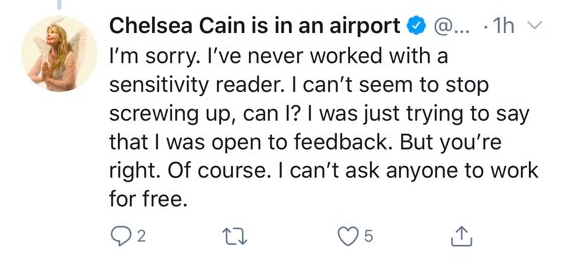
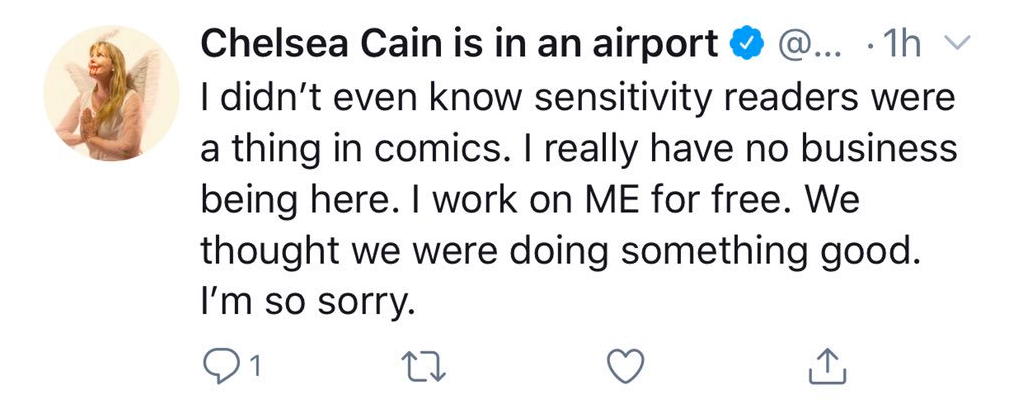
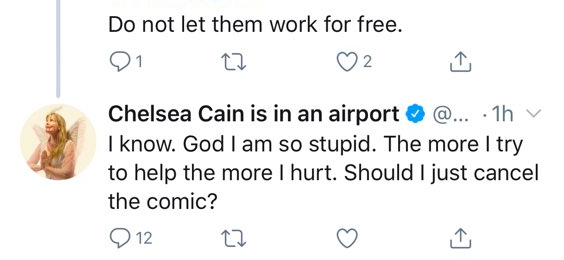
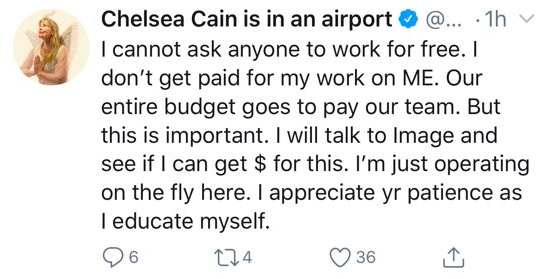
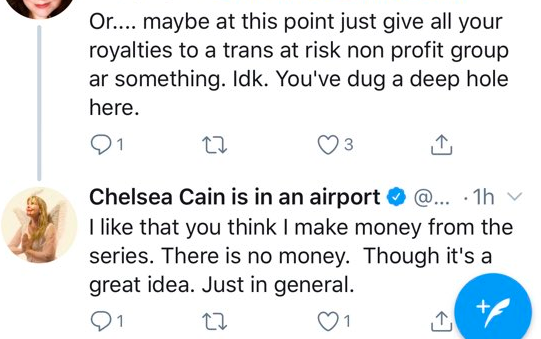
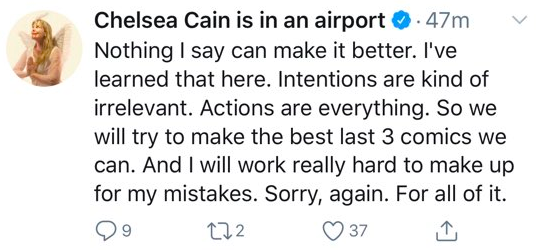
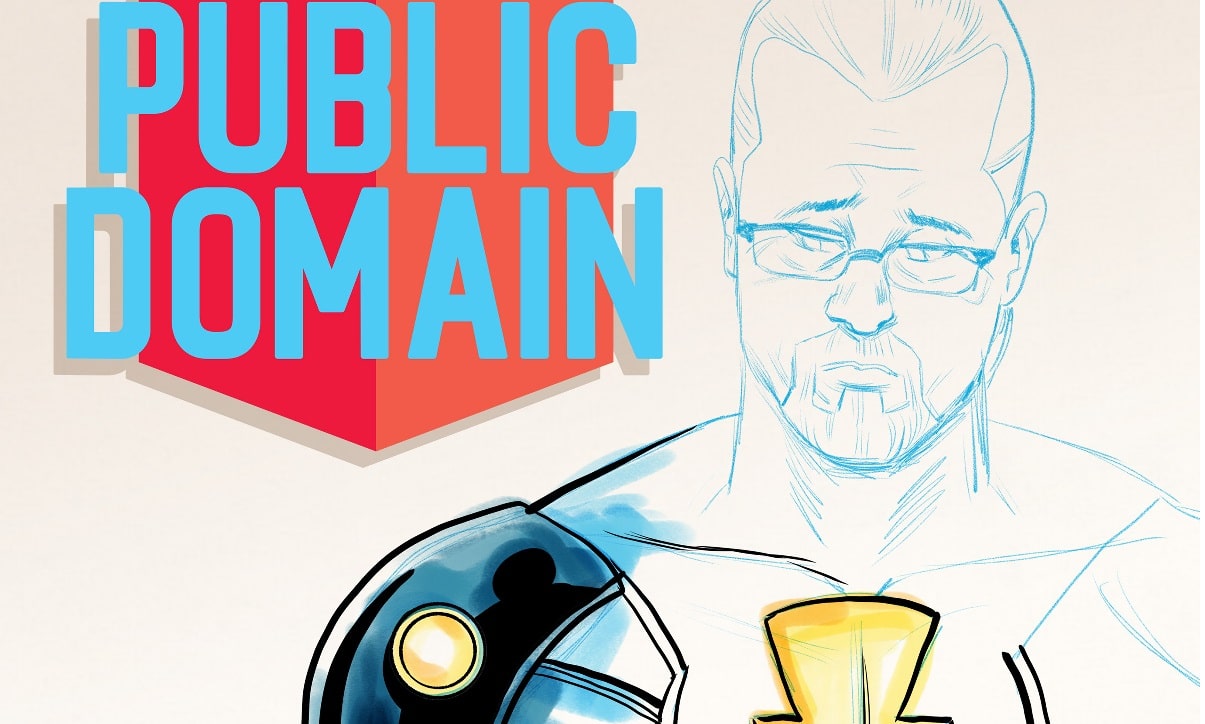
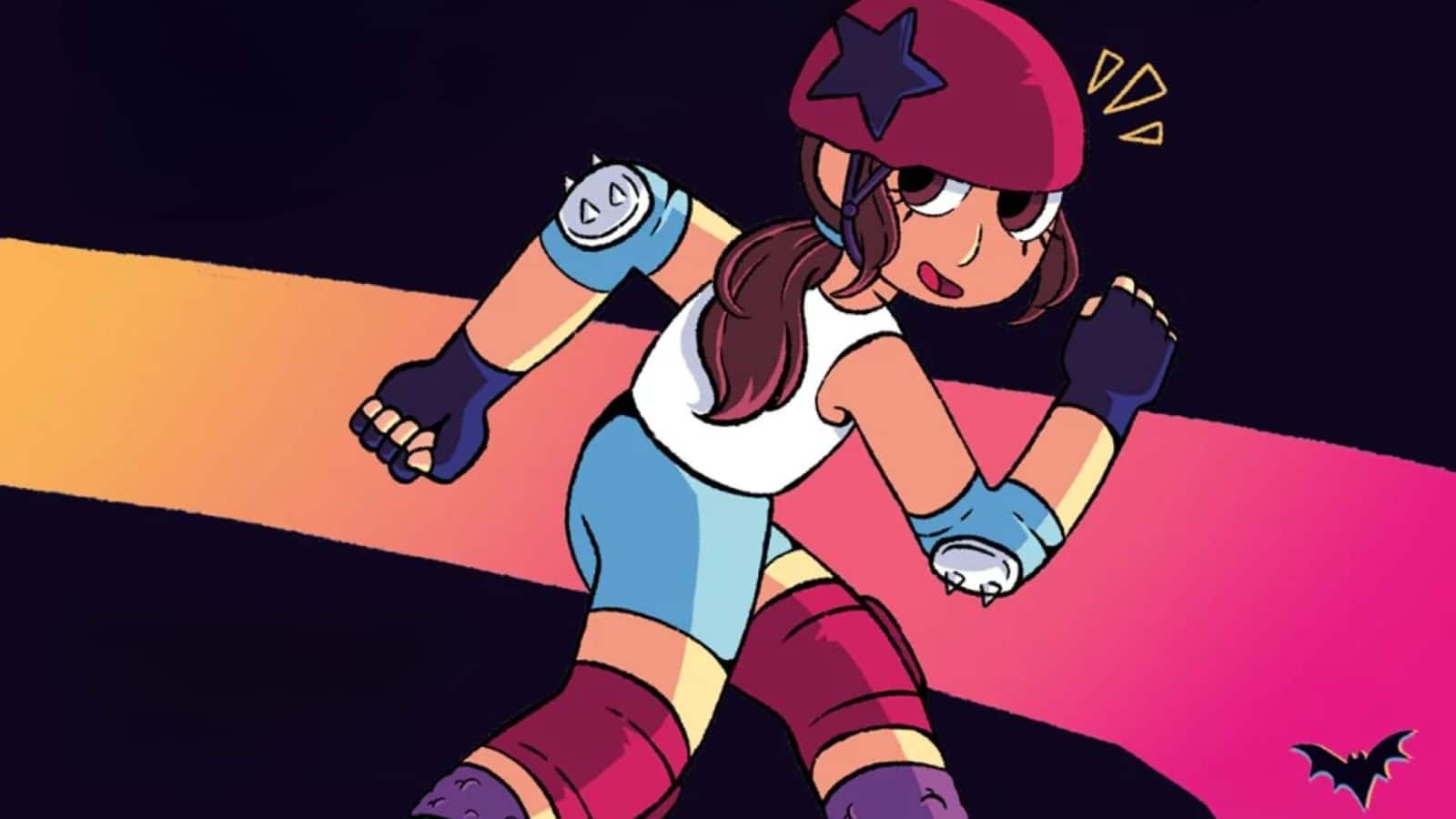
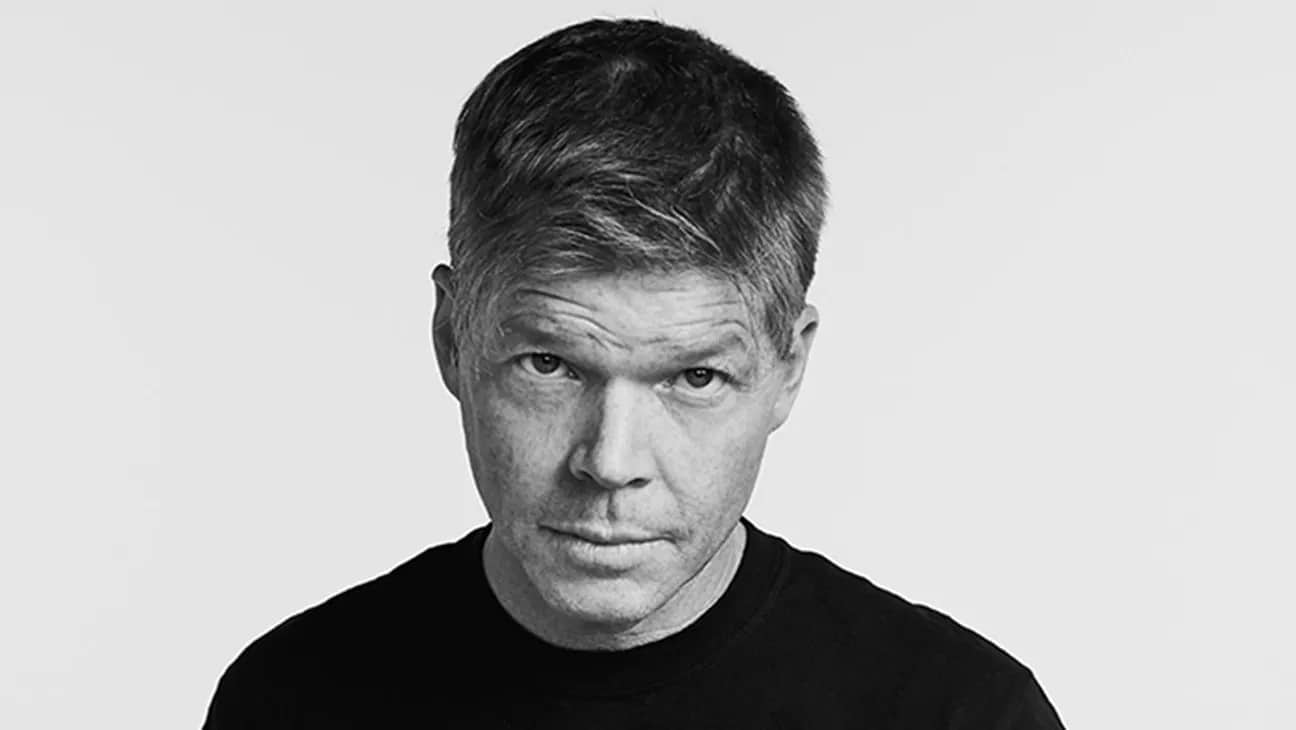



The shame is, it’s a good book if you ignore the issues of everything she overlooked. But she overlooked so much…
I appreciate the depth of this re-telling here. The details matter. But I’m basically on team Chelsea. First, copyright laws tend to protect the wrong kinds of people (Disney), so I’m not going to expend a lot of energy getting worked up about that, although it clearly seems to be a case of bad manners on her part (which, actually, is sort of a big deal). But Cain wanted to tell a story from her experience and pretty much from the beginning people have attacked her, including your original review of Man-Eaters, for not telling the story they wanted.
I’ll admit Cain seems a bit sensitive to criticism, but I also understand why. Mockingbird was attacked. Vision was aborted. Man-Eaters was attacked. Her experience in comics hasn’t been a positive one in many ways, which is a real shame because both Mockingbird and Man-Eaters are fantastic books that integrate words, visuals and ideas with a depth few comics I read do.
Cain’s written a comic that expands conversation. Does it expand it in all the ways it could? Of course not. No book could. By all means use that comic to expand it further–heck, write a book as good as Man-Eaters called Cis-Eaters and I’ll read it–but that doesn’t seem to be what’s happening (overall, not Meman per se). Instead she’s being shut down just as she was after Mockingbird. Then it was alt-right trolls. Now it’s the ourboros left.
Again, Cain erred in using those tweets (again, because manners, screw copyright), but the criticism of her work, whether Mockingbird or Man-Eaters, long precedes the concerns of this issue of the comic. I fear that one of the brightest lights in comics may end up silenced for good because attack is the only form of communication many people seem interested in these days.
This is a good article, but your copyright analysis is poor; it does not account for fair use. Here’s a good link that discusses the four factors in fair use analysis: https://fairuse.stanford.edu/overview/fair-use/four-factors/
When Meman says “I do not expect any sort of legal rights argument to come out my way,” I think they’re right; I do not believe that reprinting their tweets in the comic is a copyright violation. I do think that it’s extremely inconsiderate, rude, and ill-conceived, but probably not illegal.
“I fear that one of the brightest lights in comics may end up silenced for good because attack is the only form of communication many people seem interested in these days.”
Oh horrors, she’ll have to return to being a mere bestselling author instead of staying in a medium which she held in open disdain. What a tragic loss. /s
Man-Eaters was a comic book that was ashamed to be a comic book, and it has nothing to say other than “I am so picked on because girl”. And since the Vision mini she had planned would have been about Viv getting her first period, I’m sure it would have been just as idiotic & self-absorbed as this. The way she continually ropes in teenage girls as her shields, who she is supposedly writing this with, is especially vile; no wonder so many younger women seem to be TERFs like Cain.
Figures that the voices in her defense are from the non-ironic “so much for the tolerant left” crowd. She knows her audience, and it’s just as faux sensitive as she is.
This article was EXCELLENT, breaking down the legal issues as well as Cain’s inexcusable narcissism at every turn and Image’s casual approval of such unprofessionalism. Shame the comments inevitably bring out the dudes eager to cape for an objectively terrible person on every conceivable level cuz Those People hurt her fee-fees.
Not exactly sure why she has to justify her writing, it’s art and as far as i know the artist is still free to tell the story he or she wants.
I’m certainly not a lawyer but if you write something on social media, you should expect people to share it, as a matter of fact there’s an icon just for that purpose.
I think this looks pretty bad for Cain, who should’ve been the professional in this situation. But Meman was pretty naive for not thinking Cain might come out swinging after being called a TERF. “TERF” is an incredibly, incredibly inflammatory thing to call someone. Some radical feminists consider it a slur. Using it to describe someone who is openly and explicitly trans-exclusionary is one thing, but using it for someone who is not explicitly trans-exclusionary is pretty much fighting words. I would put it on par with accusing someone of being a Klansman.
i dunno, i think it’s disturbing how the comics industry lives to eat it’s own. So much pent up anger and grievances just waiting to go off on the next person. Cain messed up and it the mistakes escalated but also the comics community piled on with purpose. I don’t know who claims a victory here.
@JTL: The only place I see “TERF” in the article is in the quote, “I want to like @ImageComics #ManEaters so bad, but it is SO HEAVILY founded in bio essentialism and TERFness that it’s impossible to not feel like it perpetuates the same misogyny/systemic violence that it’s attempting to tackle. #ManEaters, while def cute and smart and a fun concept, is also just as lazy and exclusionary as pussy hats, white feminism, Taylor Swift-ing pop feminism.” Meman aims their criticism directly at the work. It’s not a criticism of Cain’s motives, merely the results on the page.
It can certainly hurt to have your work criticized in such a way, and I can understand why Cain would take it personally. But if Meman ever called Cain a TERF, they didn’t do it anywhere quoted in this article.
Why does she have to write about trans people? I don’t get it.
Great article, well researched. For What It’s Worth, I am an older male and have been enjoying Man-Eaters. It bravely goes where ‘no one has gone before’, and has been entertaining and fresh. I hope Cain recovers her equilibrium and stays the course for more imaginative comic creation.
I have nothing but respect for Cain, I follow her writing career thanks to her ability to defy expectations. I even wrote a post all about her on my website: https://gutternaut.net/2018/09/creator-highlights-chelsea-cain/
However I am losing any and all respect for the Twitter platform. Between the labeling and the trolling, it’s just becoming overrated and not worth the time and effort. Worst part is I still use it to communicate with people including reviews. I’m lucky I manage to keep interactions to a minimum. But there are times when the interactions with people you don’t even know can seem so frustrating.
Just a question as I try to understand this all (not trying to be a smartass- just trying to understand). As Tweets are public by there nature, why is wrong to print them in a comic? Is that because it causes zealous fans to attack the author of the tweet? Thanks.
I don’t understand why she quoted the tweets to begin with. Weird. I don’t understand why her comic had to include every viewpoint. Also weird. I’m not in the target audience for Man Eaters, so I just don’t read it. I would never attack Chelsea Cain for not taking my life experiences into consideration. I read comics that speak to me and my life experiences.
This comes off as a super weird controversy, viewed from outside. Can Cain not write about the experience of biological women in a creative way? There just seems to be a desire to destroy by over analysis of small details, such as the water fountain issue (that made perfect sense in the context of Cain’s world building were hormonal treatment is done through separate water for boys and girls throughout the book.)
It’s wrong because it’s punching down. Cain refuses to engage with the criticism but has decided to transfer the tweets (and make fun of them, if I understand the context correctly) in a venue only she can control. It’s childish and cowardly, wanting to get the last word without having to fear responses. (Only that was a mistaken assumption, obviously.)
If she doesn’t agree or don’t want to tackle the subject, Cain should have just ignored them.
There is nothing better than watching this community of massive mental health issues and fake victimization cannibalize each other. Please, keep going.
Ask Chelsea Cain about her TERF agenda.
Comments are closed.